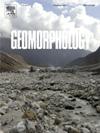Spatial provenance distributions in the Chinese Loess Plateau and implication for reconstruction of desert margin
IF 3.1
2区 地球科学
Q2 GEOGRAPHY, PHYSICAL
引用次数: 0
Abstract
Reconstructing the spatial evolution of deserts is crucial to understand the forcing mechanisms of environment change in arid region and predicting the future behavior of deserts under global warming. The eolian deposits in the Chinese Loess Plateau (CLP) provide an unrivaled archive for reconstructing the evolutionary history of deserts. While the grain size of loess is traditionally employed as an indicator of desert expansion and contraction, it primarily reflects the dust source-to-sink distance. Since the dust source of the CLP includes multiple arid regions, it remains challenging to distinguish the specific processes of an individual desert based solely on grain size. In this work, we proposed a novel provenance-based model, which can quantitatively distinguish evolutionary process of a specific desert. This model is derived from a comprehensive analysis of the Last Glacial Maximum (LGM) across transects in the CLP, which reveals that the relative contributions from the Mu Us sand fields decreased exponentially with increasing distance from the desert. We demonstrate the robustness of this model through a test on grain-size and provenance data in Luochuan, middle CLP. Finally, we apply this model to reconstruct the temporal evolution at the desert margin (Zhenbeitai, ZBT) since ca. 110 ka, which demonstrates that the boundary of the Mu Us sand fields was located approximately 20–60 km away from the ZBT site at 110–80 ka, expanded to its modern boundary at around 60–16 ka, and retreated by roughly 20 km during the Holocene. The migration of the Mu Us sand fields were primarily controlled by regional precipitation changes. This suggests that adequate regional precipitation may stabilize sand fields under future climate scenarios.
求助全文
约1分钟内获得全文
求助全文
来源期刊

Geomorphology
地学-地球科学综合
CiteScore
8.00
自引率
10.30%
发文量
309
审稿时长
3.4 months
期刊介绍:
Our journal''s scope includes geomorphic themes of: tectonics and regional structure; glacial processes and landforms; fluvial sequences, Quaternary environmental change and dating; fluvial processes and landforms; mass movement, slopes and periglacial processes; hillslopes and soil erosion; weathering, karst and soils; aeolian processes and landforms, coastal dunes and arid environments; coastal and marine processes, estuaries and lakes; modelling, theoretical and quantitative geomorphology; DEM, GIS and remote sensing methods and applications; hazards, applied and planetary geomorphology; and volcanics.
 求助内容:
求助内容: 应助结果提醒方式:
应助结果提醒方式:


